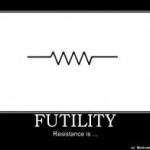 Stephen Hawking and Leonard Mlondinow’s latest book The Grand Design has astounded the philosophical community by making the audacious claim that “Traditionally these are questions for philosophy, but philosophy is dead.” [i] Dr. William Lane Craig begs to differ, please refer to this.
Stephen Hawking and Leonard Mlondinow’s latest book The Grand Design has astounded the philosophical community by making the audacious claim that “Traditionally these are questions for philosophy, but philosophy is dead.” [i] Dr. William Lane Craig begs to differ, please refer to this.
Demise of philosophy aside, Hawking necessarily robs its grave as his book is a case in point, material reductionist philosophical treatise – not hard science. He sets forth the preposterous idea that the mere existence of the law of gravity allows that the universe could spontaneously create itself out of nothing. He argues that the entire universe is the product of an arbitrary quantum fluctuation, an unintentional cosmic coincidence that has no spiritual significance.
“Because there is a law such as gravity, the universe can and will create itself from nothing. Spontaneous creation is the reason there is something rather than nothing, why the universe exists, why we exist.” [i]
Ok let me get this straight… In other words, to create itself, the universe had to exist, before it existed. Now that is futile thinking! I guess Hawking’s Grand Design is actually no design… but how grand is that? Yet he still must acknowledge that we find an astonishingly well suited set of conditions for life. This transcends credulity and he knows it. To explain away the inconceivable precision design we encounter. Hawking asserts,
But just as Darwin and Wallace explained how the apparently miraculous design of living forms could appear without intervention by a supreme being, the multiverse concept can explain the fine-tuning of physical law without the need for a benevolent creator who made the universe for our benefit.[ii]
Multiple universes? Where did they come from?
“Bodies such as stars or black holes cannot just appear out of nothing. But a whole universe can.”[iii]
Wow! This sounds like magic! Wait a minute… seriously, how can “nothing” fluctuate? Nothing literally means “no thing” and it can not do anything. But Hawking believes that nothing did something which made everything. That is futile thinking. For many more detailed rebuttal’s please follow this link as this has been demonstrated as nonsense on a number of levels.
Even his research partner Sir Roger Penrose, who won the Wolf prize for physics with Hawking for their paper which proved that time had a beginning, has spoken out against his unwarranted atheistic assertions. It seems as if a famously brilliant scientist is exhibiting embarrassingly futile thinking. I think I know why…
I have been reading A.W. Tozer’s The Knowledge of the Holy which is a book about the attributes of God and how many modern Christians have lost the proper sense of God’s awesome majesty. I highly recommend it and hope that you might read it, as the above hyperlink links to a free electronic copy. In light of Hawking’s nonsense, a few sections really stood out to me. So much so, I feel compelled to post them. First, Tozer speaks to the fact that modern man has lost his proper sense of awe and wonder for creation. Remarking on how much,
Still we do not know. Secularism, materialism, and the intrusive presence of things have put out the light in our souls and turned us into a generation of zombies. We cover our deep ignorance with words, but we are ashamed to wonder, we are afraid to whisper “mystery.” [iv]
I think this indeed the case. One’s belief in God is inextricably related to one’s sense of awe and wonder with creation. The arrogance of some scientists is rather astounding considering that we actually know so very little. Tozer’s words “that we still do not know what it is” were penned decades ago. Has science proved him wrong? Hasn’t science now unlocked reality? Actually quite the opposite, in fact, we have actually learned that we know a lot less than we thought we did in 1961. David Spergel leader of the Wilkinson Microwave Anisotropy Probe space mission reveals,
“From our experiments, the periodic table which comprises the atoms or normal matter that are said to make up the entire universe actually covers only 4.5 percent of the whole,” lead theorist Spergel said. “Students are learning just a tiny part of the universe from their textbooks. It would be dark matter and dark energy that comprise the next 22 percent and 73.5 percent of the universe.”[v]
As Dr John Lennox so astutely rebutted Hawking, “What Hawking appears to have done is to confuse law with agency. His call on us to choose between God and physics is a bit like someone demanding that we choose between aeronautical engineer Sir Frank Whittle and the laws of physics to explain the jet engine.” [vi] Dr. Lennox is indeed correct and this is where my current reading of Tozer connected serendipitously. I had just heard Lennox’s rebuttal when I read this section by Tozer:
One cannot long read the Scriptures sympathetically without noticing the radical
disparity between the outlook of men of the Bible and that of modern men. We are
today suffering from a secularized mentality. Where the sacred writers saw God, we see
the laws of nature. Their world was fully populated; ours is all but empty. Their world
was alive and personal; ours is impersonal and dead. God ruled their world; ours is
ruled by the laws of nature and we are always once removed from the presence of God.
And what are these laws of nature that have displaced God in the minds of millions?
Law has two meanings. One is all external rule enforced by authority, such as the
common rule against robbery and assault. The word is also used to denote the uniform
way things act in the universe, but this second use of the word is erroneous. What we
see in nature is simply the paths God’s power and wisdom take through creation.
Properly these are phenomena, not laws, but we call them laws by analogy with the
arbitrary laws of society.
Science observes how the power of God operates, discovers a regular pattern
somewhere and fixes it as a “law.” The uniformity of God’s activities in His creation
enables the scientist to predict the course of natural phenomena. The trustworthiness of
God’s behavior in His world is the foundation of all scientific truth. Upon it the scientist
rests his faith and from there he goes on to achieve great and useful things in such fields
as those of navigation, chemistry, agriculture, and the medical arts. [vii]
When I consider Lennox’s observation of the category error coupled with Tozer’s prescient theological analysis. I think Hawking’s descent comes into sharp focus. In A Brief History of Time, Hawking invoked God and the “mind of God” as an overarching rationality governing the Universe. How can we account for an otherwise brilliant man’s descent into self-refuting nonsense? The Old Testament is crystal clear on atheism (Ps. 53:1). But Romans chapter one actually prescribes specific consequences that aptly characterize Hawking’s latest effort,
For what can be known about God is plain to them, because God has shown it to them. For his invisible attributes, namely, his eternal power and divine nature, have been clearly perceived, ever since the creation of the world, in the things that have been made. So they are without excuse. For although they knew God, they did not honor him as God or give thanks to him,but they became futile in their thinking, and their foolish hearts were darkened.
Futile thinking indeed…
[i] Stephen Hawking, The Grand Design. New York: Bantam Books, 2010, 14.
[ii] Hawking, Design, 259.
[iii] Hawking, Design, 281.
[iv] Tozer, A.W. “The Knowledge of the Holy.” 1961. http://www.heavendwellers.com/hdt_knowledge_of_the_holy.htm (accessed 10 6, 2010). p. 14-15.
[v] Serinah Ho, “Scientists uncover secrets of universe” http://www.thestandard.com.hk/news_detail.asp?we_cat=4&art_id=103438&sid=29804544&con_type=1&d_str=20101004&fc=10 (accessed 10-5-2010)
[vi]John Lennox, ”Stephen Hawking is Wrong” http://www.dailymail.co.uk/debate/article-1308599/Stephen-Hawking-wrong-You-explain-universe-God.html#ixzz11UzsPVRd (accessed 10-5-2010)
[vii] Tozer, Knowledge, p.47-48

 -hîr
-hîr
 ns, -h
ns, -h r
r


